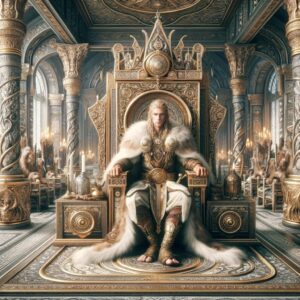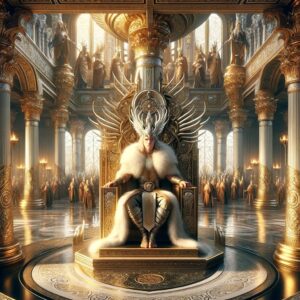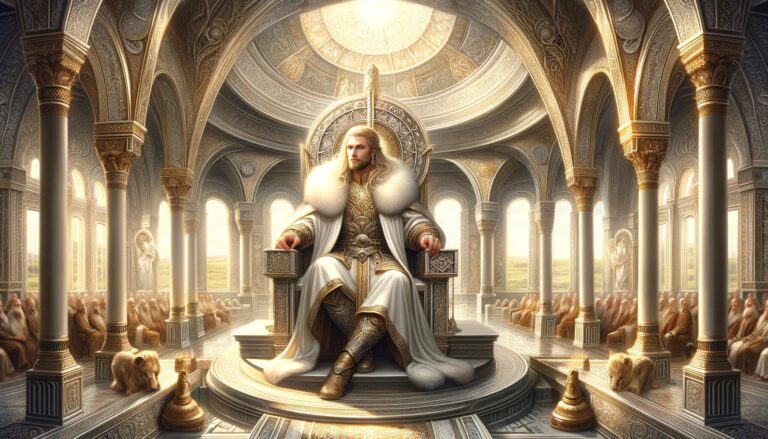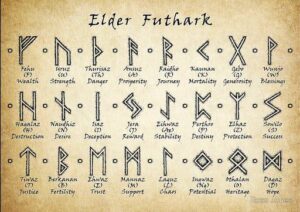Table of Contents
In the mystical realms of Norse mythology, amidst the grand pantheon of deities, one figure stands out for his unique domain and attributes – Forseti, the God of Justice and Harmony. Within this context, this mythical being possesses a rich tapestry of history, characteristics, and stories that unveil the depths of his significance within the Norse cosmology. To embark on this exploration of Forseti, let us delve into his origins and role in the grand tapestry of Norse mythology.
Origins and Lineage
Forseti’s lineage traces back to the Aesir, the principal deities of the Norse pantheon. His parentage is shrouded in a degree of mystery, with differing accounts across the sagas and poems of Norse literature. However, the most widely accepted lineage attributes him as the son of Baldr, the God of Light and Purity, and Nanna, a goddess known for her beauty and grace.
As the son of Baldr, Forseti inherits a legacy of benevolence and fairness, qualities that are central to his character as the God of Justice and Harmony. His divine lineage is a testament to his role as a mediator and arbiter of disputes among the gods and humanity.
Appearance

Youthful Appearance: Artists often depict Forseti as a youthful and ageless deity. His eternal youth signifies his timeless role as the God of Justice and his unwavering commitment to maintaining harmony and order.
Radiant and Serene: He possesses a serene and tranquil demeanor. His countenance radiates an aura of wisdom and authority, reflecting his role as a god who dispenses fair and just verdicts.
Attire: Artists typically portray Forseti wearing attire in shades of white and gold. White symbolizes purity, while gold represents fairness and divine authority. These colors reflect his character as a god of justice and harmony.
Throne or Bench: Artists often depict Forseti seated on a throne or bench, symbolizing his role as a judge and mediator. His choice of seating further emphasizes his authority in matters of justice and governance.
Scepter or Staff: He commonly holds a scepter or staff, representing his divine power and wisdom. This scepter signifies his authority to enforce judgments and maintain order in the realms of gods and mortals.
Abilities
Divine Judgment: Foremost, Forseti’s primary and most significant ability is his capacity to render fair and just judgments. When called upon to mediate disputes or conflicts, he listens impartially to all parties involved and weighs their arguments with divine insight. Consequently, his decisions are considered inviolable and final, ensuring that justice is served.
Conflict Resolution: In addition, Forseti has the extraordinary power to diffuse even the most heated disputes with his words. Furthermore, his presence alone has a calming effect, allowing him to bring about reconciliation and harmony in situations of conflict.
Pacifying Aura: Moreover, Forseti’s mere presence radiates an aura of tranquility and peace. This aura has the ability to soothe agitated emotions and reduce tension, making it easier for those in his presence to find common ground and resolve their differences peacefully.
Wisdom and Guidance: As a deity of justice and order, Forseti possesses profound wisdom and insight. He imparts guidance and counsel to those who seek his assistance, helping them understand the principles of justice and harmony. Notably, mortals often turn to him for advice on ethical dilemmas and disputes.
Authority and Enforcement: Additionally, Forseti wields divine authority, symbolized by the scepter or staff he holds. This authority allows him to enforce his judgments and maintain order in the realms of gods and mortals. As a result, his decisions are binding, and he ensures that they are carried out as prescribed.
Impartiality: Perhaps one of Forseti’s most crucial abilities is his unwavering impartiality. Remarkably, he is free from personal bias and prejudice, ensuring that his judgments are based solely on the merits of each case. This impartiality adds credibility to his role as an arbiter of justice.
Where did Forseti lived?

In Norse mythology, Forseti resided in a place known as “Glitnir.” This magnificent hall garnered renown for its beauty and splendor. It served as a serene and harmonious location that reflected Forseti’s role as the god of justice and peacemaking.
Glitnir was purposefully designed as a space for the equitable resolution of disputes and conflicts. Its immaculate and tranquil setting made it an ideal venue for hosting legal proceedings and negotiations. Within these gatherings, Forseti would preside, ensuring the dispensation of justice and amicable settlement of disputes.
The name “Glitnir” itself signifies “shining” or “gleaming,” alluding to the divine and ethereal nature of Forseti’s abode. In Norse mythology, which features descriptions of various realms associated with different deities, Glitnir stands apart as the specific hall of justice and residence uniquely linked to Forseti.
Weakness
Despite his formidable abilities, Forseti, like all Norse deities, possesses weaknesses. He unwaveringly dedicates himself to justice, occasionally resulting in inflexibility where mercy may be warranted but denied. Furthermore, his powers strictly pertain to matters of justice and harmony; he cannot intervene in battles or conflicts beyond his domain. Additionally, Forseti’s impartiality, though a strength, can be perceived as a potential weakness in certain situations, inadvertently leading to unintended consequences or injustices in some eyes. This inherent vulnerability deepens his character and mirrors the complexities of divine beings in Norse mythology.
Forseti’s friends and enemies
In Norse mythology, Forseti’s friends and enemies are not as extensively documented as those of more prominent gods like Odin or Thor. However, based on the limited information available, we can infer some general relationships and interactions.
Friends
Baldr: Many often consider Forseti as the son of Baldr, the Norse God of Light and Purity. As such, they share a familial bond, and Baldr is likely to be on friendly terms with Forseti.
Nanna: Nanna, the goddess and mother of Forseti, likely serves as a friend or ally within his immediate family.
Frigg: Due to their family connections, Frigg, the queen of the Aesir and a prominent goddess in Norse mythology, could consider herself a friend or ally of Forseti, as she is Baldr’s mother.
Enemies
Forseti is not known for having specific enemies in Norse mythology. His role as the God of Justice and Harmony focuses on resolving disputes and promoting peace, making him more of a neutral figure who strives to maintain balance and order rather than engaging in conflicts. Consequently, he does not typically have adversaries in the same way that some of the more warrior-like gods and giants do in Norse mythology.
In Norse cosmology, gods and giants often come into conflict, while Forseti serves as a mediator and peacemaker when such conflicts arise. His ability to impartially settle disputes ensures that he does not acquire personal enemies in the traditional sense.
Behavior with Humans
Forseti’s interactions with humans in Norse mythology primarily revolve around the dispensation of justice. Mortals often sought his guidance when faced with disputes or conflicts that could not be resolved through conventional means. They would bring their grievances before his divine throne, seeking his wisdom and impartial judgment.
While Forseti bound his decisions, his patience and willingness to guide mortals in comprehending the principles of justice and harmony distinguished him. He would often impart lessons on conflict resolution and the importance of peaceful coexistence, leaving a lasting impact on those who sought his counsel.
Symbols Representing Forseti
Symbols associated with Forseti are rich in meaning and significance, effectively reflecting his role as a deity of justice and harmony. Among these symbols, one of the most prominent is the “Peace Stead.” This circular sacred space served as a sanctuary where disputants could bring their conflicts for resolution. Remarkably, artists typically depict it with a central seat or throne, thus symbolizing Forseti’s divine presence as the ultimate arbiter.
Another symbol is the “Golden Scepter,” which Forseti holds as a representation of his authority and wisdom. It signifies his divine power to enforce judgments and maintain order.
Related Myths and Stories
Forseti’s presence in Norse mythology is not as widely documented as some of the more prominent gods like Odin or Thor. However, there are several notable instances and stories that shed light on his importance:
The Binding of Loki

Following Baldr’s tragic death, the gods sought to bring Loki to justice for his malevolent role in the fatal event. Recognizing the need for a fair and impartial resolution, they turned to Forseti, the God of Justice and Harmony. With his innate ability to mediate disputes and dispense equitable judgments, Forseti was the ideal choice for this solemn task.
Forseti’s entrance into the proceedings marked a pivotal moment in Norse mythology. His serene and impartial demeanor immediately diffused the tension that had engulfed the divine assembly. As he listened attentively to both the accusations against Loki and Loki’s own defense, his divine wisdom became evident.
Transitioning seamlessly between the arguments presented, Forseti weighed the merits of each case with unwavering impartiality. He evaluated the evidence and testimonies, ensuring that justice would prevail. His role as an arbiter became a beacon of hope, a symbol of order and fairness in the midst of chaos and sorrow.
Ultimately, Forseti rendered his judgment. While Loki’s actions were undeniably malevolent, Forseti’s decision was characterized by its balance and fairness. He ensured that Loki faced a punishment that was just, reflective of the severity of his deeds but not excessively harsh.
The resolution brought by Forseti served as a testament to the importance of justice in Norse mythology and the vital role played by this god of harmony. His involvement not only provided closure to a tragic chapter but also reaffirmed his place as a central figure in the pantheon, embodying the eternal pursuit of righteousness and equilibrium.
The Tale of the Mead of Poetry
In the captivating myth known as “The Tale of the Mead of Poetry,” Forseti’s pivotal role in resolving a profound dispute unfolds. Firstly, the narrative commences with the theft of the Mead of Poetry, an elixir renowned for bestowing the gift of eloquence upon those who partake in it.
Subsequently, this theft gave rise to a bitter conflict among the gods and giants, each vying for control over this coveted substance. With the shared desire for a resolution that would honor the principles of fairness and equality, the divine assembly turned to Forseti, their trusted arbiter of justice and harmony.
As Forseti presided over the proceedings, his tranquil presence had a calming effect on the heated emotions that had engulfed the assembly. With his divine wisdom, he attentively listened to the arguments presented by both gods and giants, ensuring that each side had an opportunity to voice their grievances.
Forseti meticulously evaluated the merits of each argument, considering the consequences of his judgment carefully. His impartiality shone brightly, for he was free from personal bias or favoritism.
In the end, Forseti delivered his verdict. His judgment, characterized by its balance and equitability, affirmed the rightful ownership of the Mead of Poetry. It was to be shared among both gods and giants, promoting harmony and cooperation rather than discord.
The Lay of Forseti

“The Lay of Forseti” from the Poetic Edda unveils a poignant tale that celebrates Forseti’s divine role as the god of justice and peacemaking. Firstly, the narrative unfolds in a world where disputes and conflicts among gods and mortals were not uncommon.
Intriguingly, the poem commences with a realm plunged into chaos, where discord and strife had shattered the delicate fabric of existence. Remarkably, the gods, weary of the ceaseless conflicts, turned to Forseti, the beacon of order and equilibrium. With his divine presence infused, a sense of hope and anticipation gripped the divine assembly, for he was renowned as the ultimate arbiter.
With a serene and composed demeanor, Forseti assumed his role as mediator. He gathered the disputants, both divine and mortal, beneath the sacred branches of Yggdrasil, the World Tree. There, he listened attentively to their grievances, his impartiality resolute and unwavering.
Transitioning seamlessly between the arguments, Forseti’s wisdom shone brilliantly. His words, like a soothing balm, quelled the animosity that had festered for so long. He implored the warring parties to seek common ground, emphasizing the necessity of harmony in the tapestry of existence.
With Forseti’s guidance, reconciliation became attainable. Resentments were set aside, and resolutions were forged. The realms once torn asunder were now united in a shared commitment to peace and order.
“The Lay of Forseti” serves as a poignant testament to the indomitable power of justice and the transformative influence of a god who embodied it. Furthermore, Forseti’s ability to restore tranquility amidst chaos, as captured in this timeless poem, reaffirms his vital role in Norse mythology as the embodiment of fairness and peacemaking.
Other Creatures
While Forseti’s role as the God of Justice and Harmony is unique within Norse mythology, there are other mythical beings in various cultures with similar attributes. In Greek mythology, Athena, the goddess of wisdom and justice, shares some parallels with Forseti in her role as a mediator and protector of the righteous.
Similarly, in Hindu mythology, Dharma, the god of moral order and justice, bears a resemblance to Forseti in his role as an arbiter of disputes and upholder of righteousness.
FAQ
What is Forseti's role?
Forseti's primary role is to mediate disputes, render fair judgments, and promote peace and order among gods and mortals.
Where does Forseti reside?
Forseti is said to reside in a magnificent hall called "Glitnir."
What are Forseti's abilities?
Forseti has the ability to make fair and final judgments, resolve conflicts, and promote harmony. He radiates a calming presence and possesses divine wisdom.
Who are Forseti's family members?
Forseti is often considered the son of Baldr and Nanna, and he has family connections to other Norse deities.
What symbols are associated with Forseti?
A prominent symbol of Forseti is the "Peace Stead," a circular sacred space used for conflict resolution. He is also often depicted with a scepter or staff symbolizing his authority.
What is the significance of Forseti in Norse mythology?
Forseti plays a crucial role in maintaining justice, order, and peace in the Norse cosmos, highlighting the importance of fairness and harmony in their world.




